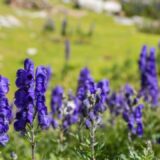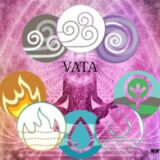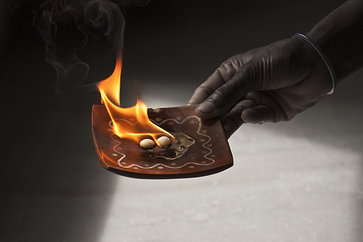Traditional Ayurvedic Approach To Epilepsy (Mirgi Fits) Treatment
Epilepsy is a brain disorder in which clusters of nerve cells, or neurons, in the brain, sometimes signal abnormally. Neurons generally generate a signal (electrochemical impulses) to all parts of the body that acts to produce human thoughts, feelings, and actions.
But in the case of epilepsy, the normal pattern of neuronal activity becomes disturbed resulting in strange sensations and emotional behavior. Sometimes symptoms such as muscle spasms; convulsions and loss of consciousness are also seen.
During this sudden attack of illness, neurons may fire up to 500 times per second, which is much faster than a normal person. In some people this attack of illness is occasionally; for others, it may happen up to hundreds of times a day.
Epilepsy is also known as a seizure disorder that is generally diagnosed after a person has had at least two seizures (except in the condition-case of alcohol or due to extremely low blood sugar).
It is sometimes diagnosed even after one attack, in a situation where a person puts them at high risk of having another.
Epilepsy Causes
The causes of epilepsy are unknown most of the time experts believe that epilepsy generally may be related to a brain injury or a family tendency. The low oxygen during birth is also responsible to some extent for the causes of epilepsy.
Epilepsy History Background
The word “epilepsy” comes from the two Greek words “epi” and “Leptos” The epi means (upon, in, near), and the Leptos means (seizure).
From these roots, we have the old French word called Épilepsie. In Latin, it is called Epilepsia; in Greek, it is called Epilepsia or epilepsies; in India, it is known as margin.
Epilepsy was one of the first brain disorders to be described in ancient Babylon more than 3,000 years ago. The strange behavior caused by some seizures has contributed a lot, through the ages of many superstitions and prejudices.
The people believed that during the attack of epilepsy, demons or gods visit them. However later in 400 BC, the physician Hippocrates suggested that epilepsy was a brain disorder.
Ayurvedic View on Epilepsy
Epilepsy is termed as “Apasmara” or “Apasmaram” in Ayurveda, the main reasons cited by Ayurveda scripts include lazy life, stressful life, suppression of natural urges, and poor diet.
Different type of epilepsy is caused due to distinct reasons. The best way to find reasons is to go through an examination by an Ayurvedic physician. Epilepsy is mostly caused due to a Vata disorder, but it can additionally be caused by vitiation of pitta or Kapha.
Vata-type seizure is generally a mental problem that is caused due to poor sleep, stressful days, and mental exertion. Digestive complications like gastritis, constipation, etc. can also be reasons.
There are several Ayurvedic treatments for epilepsy that are described in ancient Indian texts called “Vedas”. The principles of Ayurveda were subsequent for generations and then finally revealed through the Samhitas (the encyclopedic works) of Caraka and Sushruta dating back to about 1000 BC.
The Ayurvedic treatment for epilepsy is referred to as the clinical manifestations of the disease, which is divided into four types according to the body type ‘dosha’ of each person or mood. According to Ayurvedic texts, there could be these reasons for epilepsy.
- It might be due to internal factors such as genetics or idiopathic.
- Due to constitutional alterations and enzymes.
- Due to external factors such as trauma, unhealthy food, worms, and environmental factors.
- Psychological factors could also be responsible.
The diagnosis of epilepsy is only carried out after a comprehensive evaluation, as well as a detailed history of the patient.
Ayurvedic Treatments for Epilepsy
The ayurvedic treatments generally depend on the type of epilepsy that is detected as well as its historical background. In the case of external factors, certain mantras and hymns are used for healing.
The heart and mind channels are sought to be unlocked this way. Enemas or purgatives are also part of the treatment in which some purified butter and other Ayurvedic compounds are given to a person according to their circumstances.
Certain functions prepared by mixing herbs and animal ingredients are also used for topical applications. Ayurvedic treatments for epilepsy may consist of silver, gold, various oils, and different herbal made a remedy that can be taken internally or applied topically such as :
- Bacopa monnieri
- Withania somnifera
- Sarpagandha vati
- Svarna bhasma
- Svarnamakshika bhasma
- Vaatakulantaka rasa
- Yogendra Rasa and many others.
Many experts believe that these Ayurvedic treatments for epilepsy must be tested for efficacy and then used in combination with conventional therapies as a complementary or holistic approach.
Herbs Used To Cure Epilepsy
Herbs and spices are used by many millions of people for many illnesses, below are some of the medicinal plants for epilepsy that are very useful.
1. Passion Flower
According to UMM, the herb passionflower can help to prevent seizures. But a service of the U.S Library of Medicine “MedlinePlus” says that there is insufficient evidence to prove this. The Passionflower is often combined with other relaxing herbs like valerian and chamomile and is considered safe if when used medicinally for less than a month.
There are some side effects too such as dizziness, confusion, and sleepiness. Passionflower may interact with other medications and reduce their effectiveness, so take the advice of a medical professional before using this herb.
Note: Pregnant women must not use this herb as it can cause the uterus to contract.
2. Kava kava
It is also one of the herbs which are beneficial in epilepsy described by “The University of Maryland Medical Center”. Kava is a traditional herbal remedy used for convulsive disorders such as epilepsy.
It is called “Piper methysticum” which belongs to a member of the pepper family. It is also used to treat insomnia, anxiety, and fatigue. Kava can be taken as tea or in the form of a capsule.
Note: Do not use this herb without consulting a doctor. This herb can cause serious side effects such as liver damage and hepatitis and must not be used by people with liver disease.
3. Bacopa
The anti-seizure property of the leaf extract of Bacopa monnieri is attributed to the saponin compounds found in it. They Increase the activity of brain chemicals such as serotonin and gamma-aminobutyric acid, which are believed to reduce calcium current in pyramidal and interneurons that trigger epileptic seizures.
An extract of bacopa reduces the rate of seizures in a small group of people. As well as increase the level of serotonin and gamma-aminobutyric acid the two chemicals in the brain that is thought to regulate pyramidal neurons and interneurons that initiate epileptic activity.
4. Aloe vera
Aloe vera extract especially found in southern Africa belongs to the lily family and has a complex set of chemical properties that could cure diseases such as epilepsy.
According to an article published in the journal “Toxicology and Applied Pharmacology,” a study carried out by Lourdes Rodriguez-Fragoso and colleagues found that a polysaccharide gum that comes from the aloe vera plant has been useful and beneficial against epilepsy.
Yoga As A Treatment For Epilepsy
There is some evidence that shows yoga can be very useful to people with epilepsy. The goal of yoga as a treatment for epilepsy is to aim the body to improve internal balance. It is an attempt to achieve inner peace and slowdown in domestic activities.
When yoga is used in addition to other ayurvedic treatments for epilepsy it can improve a person’s health in many different ways. This can help to reduce the severity or frequency of seizures that a person can experience.
Home Remedies to Cure Epilepsy
1. A juice of Hastifolia Monochoria added to milk should take at night.
2. Regular intake of garlic juice is good for the treatment of epilepsy.
3. Acorus calamus powder with honey must be taken.
4. A juice of Racemus asparagus added to milk must be taken at night for several days for the cure of epilepsy.
5. A juice of Benicia hispida 100 ml a day is good for epilepsy.
While epilepsy is different for everyone Finding the right medication and dosage can be complex. Your doctor will consider your condition, frequency of seizures, your age and other factors when choosing which medication to prescribe.



























Epilepsy cannot be fully cured but can be managed to some extent. Hence the family members of epilepsy patients need to be very careful so that the patient can lead a healthy life.Life style management is most important and essential aspect of epilepsy which need to be followed by the patient and family members.
I am suffering from epilepsy, I am currently having a allopethy treatment ( Levipil 750 & Zenretard 300 twice a day). I went to aruvedic treatment gave me medicine straight away without asking my history. He told me that i will have carry this for 3 years, I initially took that because it was cheap. But i am very confuse whether i take it or continue with allopethy???? please reply
9929805098,SURAJ PURA,PANCHYA KI NIMDI,KEKDI KE PASS RAJASTHAN
My daughter suffng from epilapic last 15year and take alopatic medicin regularly now l want ayurvadic treatment if possible
I understand that some copper peptides can help to stop seizures that are not related to epilepsy. Recent studies revealed that peptides can work better that most anti-anxiety drugs such as Valium (Diazepam). This could be a major breakthrough.One such peptide is SR9009
If you witness somebody having seizures?
• Loosen wear things like shirts, belts, etc
• Do not place something within the person’s mouth, particularly your fingers
• Make certain that the person cannot fall or hit one thing within the space
Epilepsy may be even more common than we have heard or seen as most of the persons probably not even unrecognized it.
Experts believe that Epilepsy is a group of disorders, remember not a single condition that causes to do with brain malfunction – in fact, asking what is epilepsy is rather like asking what is the weather, when every day is different
The Brainstorm Series of 6 books, authored by Steven Schachter, USA Professorial Neurologist of outstanding experience, highlights heartfelt personal letters from people around the world who have epilepsy and seizures, or who care for them professionally or personally
my son has seizure and is 3 years of age. There are distinctive seizure signs in children, keeping a close watch on the changes in the body actions and the level of vigilance of the child, doctor can perspicuously point out the type of seizure a child has experienced.
Different types of seizure symptoms are found in children. On keeping a watch on the changes within the body movements, an expert doctor can clearly signifies the sort of seizure child has.
The most common brain disorder in the world is the most misunderstood and neglected – Epilepsy is far more widespread than is generally realized, affecting 40 to 50 million people worldwide – around 1 in 200 of us.
Epilepsy can encounter anyone at any time; however, it is not an ailment. Generally, it affects brain, but it is not a mental or psychiatric disorder. It is also seen that it passes from generation to generation, but it is not infectious. It is not generally responsive to treatment but in up to 80 per cent of cases can be managed efficiently by drugs.
Epilepsy can start in a person’s life, at any point and most epilepsy can be diagnosed in childhood or in the first year of life
The Brainstorm Series of 6 books, authored by Steven Schachter, USA Professorial Neurologist of outstanding experience, highlights heartfelt personal letters from people around the world who have epilepsy and seizures, or who care for them professionally or personally.